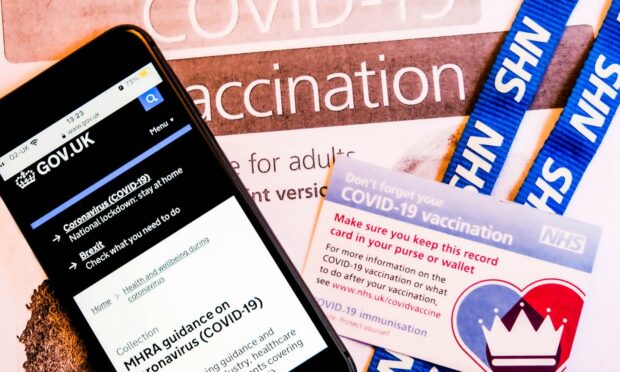Many of the potential side-effects of the Covid-19 jabs have been well-publicised, and official stats have now revealed just how common each can be.
Across the UK, almost 100 million doses of the AstraZeneca, Pfizer/BioNTech and Moderna vaccines have been administered.
And of these recipients, around 375,000 reports of suspected side-effects have been made to the national medicine regulator, the MHRA.
These cover flu-like aches and pains, through to severe allergic reactions, blood clots and menstrual problems.

Each report does not necessarily mean any reaction is directly linked to the vaccines – factors such as underlying health conditions could be at play – and most will contain more than one suspected side-effect.
However, the figures as a whole are being monitored closely for trends and causes for concern.
How many Covid vaccine side effects have been reported?
Altogether, the MHRA says the rate of Yellow Card reports of side-effects from the Covid vaccines is between three and six per 1,000 doses.
Additionally, the jabs’ clinical trials show the more common flu-like side effects occur in around one in 10 cases.
Anaphylaxis
The MHRA says severe allergic reactions to the vaccines have remained “very rare,” and those with allergies to any of the ingredients should not receive it.
Newly-released figures, accurate as of October 13, show:
- AstraZeneca: 825 cases
- Pfizer/ BioNTech: 501 cases
- Moderna: 40 cases
Blood clots
Concerns around blood clots led to changes in the guidance for who should receive which vaccination.
In March a number of European countries briefly suspended use of the AstraZeneca jab while reports of thrombo-embolic events were looked at in greater detail.
It led to the Joint Committee on Vaccination and Immunisation recommending that under-40s receive the Pfizer/ BioNTech or Moderna jabs instead. But, while the chances of developing blood clots with the AZ jab are higher, doctors say the benefits still outweigh the risks.
Overall, you are more likely to develop a blood clot as a side effect from a four-hour flight or the contraceptive pill than you are the AstraZeneca Covid vaccine.
Reports of blood clots with low platelet counts, as of October 13:
- AstraZeneca: 421, including 46 after the second dose. Of these, 72 people died (17%). This is the equivalent of 1 per million doses in 18-to-49-year-olds, and 1.9 cases per million doses for over-50s.
- Pfizer/ BioNTech: 20 cases, with two deaths
- Moderna: 2 cases, and no deaths
Capillary Leak Syndrome
Out of more than 49 million doses of the AstraZeneca vaccine, there have been 13 reports of Capillary Leak Syndrome.
Three of these people had a previous history of the condition, where fluid leaks from small blood vessels in the body.
Menstrual disorders
The MHRA says it is reviewing 40,350 reports of period problems after the Covid jab – but has stressed there is no evidence suggesting it can affect fertility or someone’s ability to have children.
These issues including heavier-than-usual periods, delayed periods or unexpected bleeding.
In a statement, it said: “The number of reports of menstrual disorders and vaginal bleeding is low in relation to both the number of people who have received Covid-19 vaccines to date and how common menstrual disorders are generally.”
Myocarditis and pericarditis
Concerns have been raised in recent months about the possibility of the coronavirus jabs leading to myocarditis and pericarditis – issues relating to inflammation of the heart.
It appears they present more frequently in males, and shortly after the second dose.
Often the symptoms are chest pain, shortness of breath or a pounding heart, with the events themselves “typically mild” with short recovery times.
As of October 13, the following Covid vaccine side effects have been reported:
- AstraZeneca: 120 myocarditis, 177 pericarditis, 17 others.
- Pfizer/ BioNTech: 337 myocarditis, 265 pericarditis, 13 others.
- Moderna: 86 myocarditis, 52 pericarditis, 1 other.
Three deaths relating to heart inflammation have been reported after the Pfizer/ BioNTech vaccine, and two following the AstraZeneca.
Guillain-Barré Syndrome
This condition affects the nerves, causing numbness and pain in the feet, hands and limbs.
It is thought to be caused by an issue with the immune system, but is treatable and most people will make a full recovery.
As of October 13, the following reports have been received:
- AstraZeneca: 432 cases, and 26 of related Miller Fisher syndrome
- Pfizer/ BioNTech: 59 Guillain-Barré cases, 1 Miller Fisher case
- Moderna: 4 cases
How many people have died from a Covid jab?
The MHRA does compile data relating to fatal adverse reactions in the days and weeks after someone has received a Covid jab.
However, it says older age and chronic underlying illness have played a large factor and must also be taken into consideration when looking at the numbers.
Additionally, “several thousand” deaths have occurred naturally, but coincidentally within seven days of receiving a dose of the vaccine.
As of October 13, the following reports have been received:
- AstraZeneca: 1,101 deaths
- Pfizer/ BioNTech: 564 deaths
- Moderna: 19 deaths
- Unspecified: 31 deaths
Benefits ‘outweigh risks’
The MHRA says getting the jab is still the most effective way to lower your chances of dying or becoming seriously ill from the disease.
A statement said: “As with all vaccines and medicines, the safety of Covid-19 vaccines is continuously monitored and benefits and possible risks remain under review.
“We take every report of a suspected adverse reaction seriously and encourage everyone to report through the Yellow Card scheme.”
